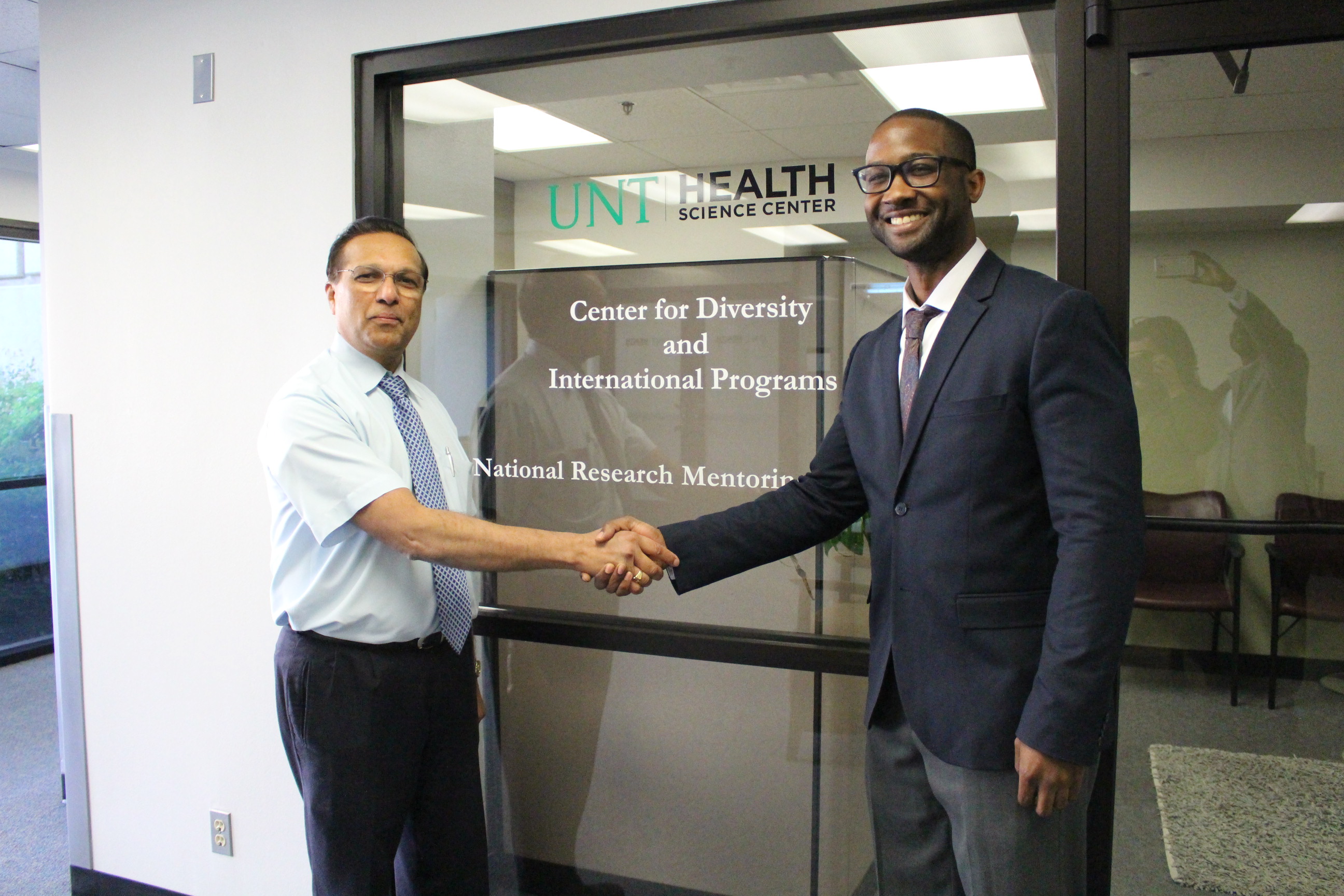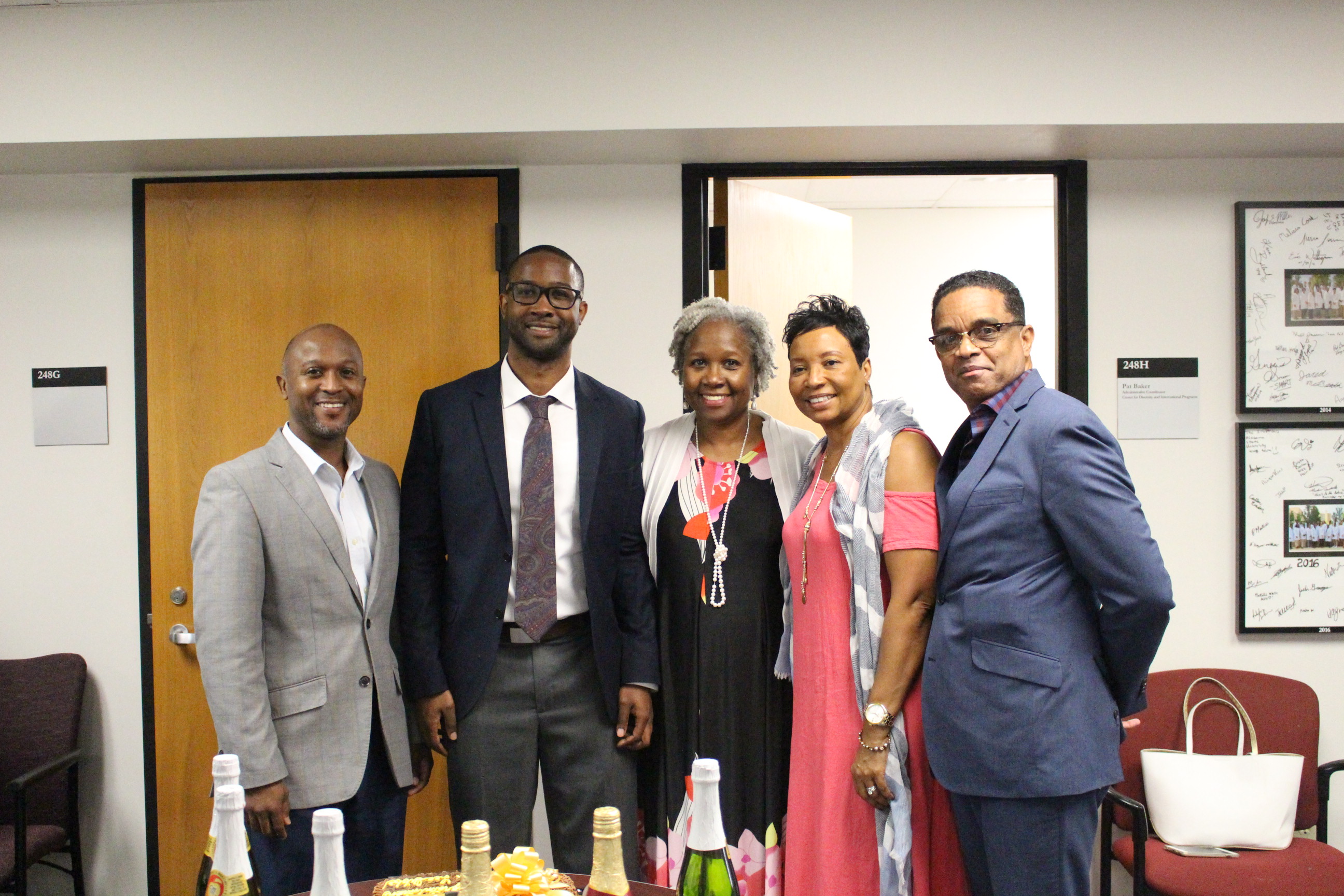Written by Gaoyuan Liu
Last month Lee D. Gibbs, Ph.D., graduated from the University of North Texas Health Science Center (UNTHSC) with his Ph.D. in Biomedical Sciences, Cancer Biology and prestigious high honors on his dissertation. For the next step in his biomedical research career, Gibbs has chosen to undertake a postdoctoral fellowship in the Translational Genomics Department at the Keck School of Medicine at University of Southern California in Los Angeles.
A key mentor of Dr. Gibbs was Jamboor K. Vishwanatha, Ph.D., who is Special Assistant to the Provost for the Center for Diversity and International Programs, Professor of Molecular and Medical Genetics, and Director of the Texas Center for Health Disparities at the University of North Texas Health Science Center. Dr. Vishwanatha is also Principal Investigator of the National Research Mentoring Network’s Mentoring and Networking Core.

Jamboor K. Vishwanatha, Ph.D. & Lee Gibbs, Ph.D.
“There are so many job opportunities for biomedical scientists and you will need assistance in navigating the right career path. Whether it is talking to the right person, applying for grants, attending workshops and conferences, you will need effective mentorship,” says Dr. Gibbs.
Dr. Gibbs spent six years at UNTHSC, culminating in the recent success of his dissertation which sought to identify potential molecular markers that could predict clinical outcomes in African American women with Triple-Negative Breast Cancer. The aim of his dissertation originates from a childhood memory of a late cousin that suffered from a rare cancer. From that point onwards, Gibbs resolved to enter the field of cancer research, with science as his “tool to make significant changes.”
In his interview with NRMN, Dr. Gibbs spoke on the importance of pivotal mentors in his life.
“My parents were the first to show me how someone should be mentored. Although their degrees weren’t in science and they often times did not have the answers I was looking for, they never gave up on mentoring me. Instead, they introduced me to people that could guide me to my intended destination” he says.

Gibbs Family Celebrating Dr. Lee Gibbs’ successful dissertation.
Networking can play a crucial role in furthering one’s career and success in biomedical research. The process of connecting with others through networking quite often leads to exposure to knowledge from outside of one’s own area of study, and lends itself to additional opportunities to collaborate with other scientists, or expand the impact and scope of one’s research. Dr. Gibbs has accessed fifty or more mentors throughout his life. Each one of them has played a pivotal role along his journey.
Dr. Gibbs learned from his mentors about the importance of conducting prior research on potential scientific mentors, and thinking critically about the prospective colleagues in a potential research environment before deciding whether to join it as lab mates must work closely and productively with one another every day. Dr. Gibbs performed this prior research about Dr. Vishwanatha, which informed his decision to developing their mentoring relationship. He noted that his mentorship with Dr. Vishwanatha has opened countless doors to new connections, exposure, and opportunities.
Dr. Gibbs highlighted the importance of professional exposure and pushing oneself out of a personal comfort zone, a value he has recognized deeply since attending his first summer research program at Louisiana State University at Shreveport Health Science Center at the age of sixteen. “I just wanted to do research. I wanted to create something and give it to the world,” he comments. “You are never too young to set goals and obtain the future you wish to compose.”
Dr. Gibbs affirms that NRMN, having exposed him to various opportunities, will remain a strong asset as he continues his postdoctoral studies. As a network member, he foresees that engagement with NRMN will play a key role as he navigates into an academic faculty position, where connections will be crucial to advancement. With the values of mentorship in mind, he has already begun to return the favor of mentorship, having spoken at career roundtables in middle schools and high schools as well as at his alma mater Xavier University. In the near future, he plans to continue sharing the experiences of his journey to encourage students who are contemplating a career in the sciences.
For those aspiring for their own Ph.D., he imparts advice that has guided his own career:
“You have to keep pushing. You must be courageous, brave, and persevere through all obstacles and temporary defeat.”
You may connect with Dr. Lee Gibbs on the National Research Mentoring Network’s Networking platform, MyNRMN through your free account on NRMNet.net by searching for his profile within the NRMN Community. He is happy to support and give back to the community of future science practitioners.